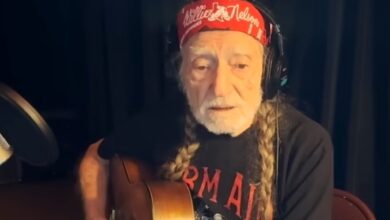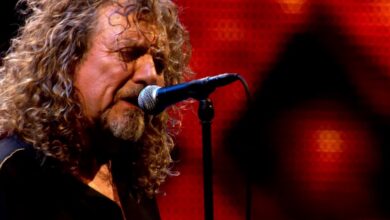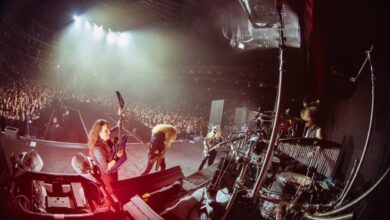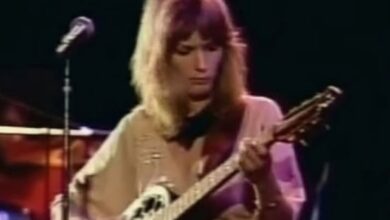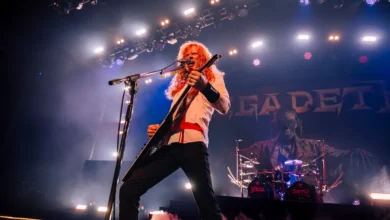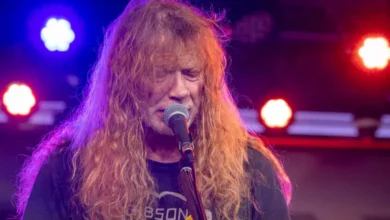KISS Live at Madison Square Garden 1996: The Night the Spaceman Lit Up New York One Last Time
On a sweltering New York weekend in late July 1996, Madison Square Garden didn’t just host a rock show—it hosted a resurrection. By the time the houselights fell, the sold-out arena felt like a shared secret among thousands who had waited years to see the original four—Paul Stanley, Gene Simmons, Peter Criss, and Ace Frehley—stride out in makeup again. This was the Alive/Worldwide Reunion Tour in full thunder, the first run with the classic lineup since the ’70s, and New York City—KISS’s old stomping ground—was always going to be a proving ground. The rumor mill had already buzzed about Tiger Stadium’s explosive tour opener, but MSG had its own gravity: a homecoming with skyscraper expectations.
They hit like a starting pistol. “Deuce” opened the throttle, its stamped-steel riff ricocheting off the Garden’s rafters as the logo blazed and the hydraulic risers lifted the band into their larger-than-life silhouettes. Instantly the room moved like a single organism—beer cups in the air, leather jackets brushing shoulders, strangers singing like family. You didn’t need the setlist to know what came next; you felt it in your sternum before you heard it. The reunion wasn’t a nostalgia pageant—it was a living, breathing machine reactivated at full voltage.
New York got a run of shows, and each felt like chapter and verse of the same revival text. Night after night, the Garden’s marquis glowed and the scalper chatter hummed along Eighth Avenue. Openers rotated, but the headliners arrived like clockwork: chrome boots, black leather, and that cathedral-sized logo. “King of the Night Time World” slammed into “Do You Love Me,” and those choruses—big as Broadway—proved the band hadn’t just dusted off a museum piece. They’d tuned it for the 90s, then lit the fuse.
Part of the magic came down to pacing—KISS sequenced the show like an amusement-park blueprint. Tight curve, sudden drop, breath, then the straightaway. After the sleek strut of “Calling Dr. Love,” the room got a shot of barroom frost with “Cold Gin,” its bluesy crawl widening smiles in every section. “I Stole Your Love” brought the sprint back, Paul’s right hand a hummingbird blur, his mic-stand jabs landing with dancer’s precision. The cameras caught teenagers on their parents’ shoulders, living proof of how this circus had turned generational.
And then there was the thing you can’t choreograph: the chemistry. Simmons and Stanley assumed their familiar gravitational pull—magnet and mirror—while Criss hammered with a boxer’s snap, feathering the ride like a metronome with a grin. But you could feel the crowd’s gaze keep drifting to stage right, where Ace Frehley carved open pockets of air with that elastic vibrato. The Spaceman didn’t just play leads; he threaded neon through the night’s black canvas, his tone a Bronx streetlight in winter fog—hazy at the edges, bright at the core.
When “Shout It Out Loud” arrived, the Garden answered like a choir at full roar. The song’s two-frontman engine—Paul and Gene trading lines like relay runners—turned the arena into a scoreboard of faces: security mouthing lyrics, vendors singing behind the last row, a circle of twenty-somethings in vintage tees jumping in place like pistons. By then the show had slid past “spectacle” into “ritual.” You didn’t just watch KISS; you joined them, your voice enlisted into the chorus that made the band bigger than the stage that contained them.
The production flexed like a Marvel origin story. Pyro didn’t just pop; it spoke—syncopated fire-language punctuating the riffs. Platforms rose and fell with wrestler drama. When Simmons did the blood-spit and fire-breathing routine, the decibels lifted into stadium-chant territory. Frehley’s smoking guitar bit felt like a chapter the city itself knew by heart, and when his Les Paul “fired” into the lights, a pocket of the upper bowl reacted as if the Knicks had just hit a buzzer-beater. The Garden adores confidence; KISS served it with kerosene.
Ace’s solo spot functioned like a biography with no words. He’d hang on a bent note until it felt like the whole arena leaned with it, then tumble down the neck in runs that sounded like a subway car skipping stations. The smoking pickup gag would be kitsch in lesser hands; in his, it became punctuation—street-wise humor between bursts of melodic heat. Every time the camera found his grin—the Spaceman’s half-mischief, half-zen—you could feel why New Yorkers still claim him as one of their own.
Mid-show, the tempo shifted to let the crowd breathe—then “Watchin’ You” and “Firehouse” put the spark back under the lid. The set design hid no angles; mirrors and catwalks ensured nosebleeds got the same comic-book frame as the pit. Between songs, Paul conducted like an M.C. who’d learned his timing in clubs—“I wanna hear you!”—then cut the band back in with surgical cues. If the reunion was a gamble, the Garden shows proved the math: put four original archetypes in the same frame, and the picture completes itself.
By the home stretch, the atmosphere felt weightless. “Love Gun” vaulted Paul to the mini-stage, a confetti-sweet Wow! that made the back row feel like front row for sixty seconds. “Detroit Rock City” hammered like Broadway rewritten in gasoline. And “Rock and Roll All Nite”—the confetti hurricane, the lights to twelve, the final downbeat that keeps ringing in your chest on the subway home—closed the circle between 1976 and 1996. The Garden didn’t just host KISS; for two hours, it became KISS.
What separated ’96 from the reunion cash-ins that litter rock history was intent. The band didn’t simply cosplay their past; they re-inhabited it. The Alive/Worldwide tour would go on to be the top-grossing trek of 1996, a statistic that reads like trivia until you stand in a room like the Garden and feel the receipts in the roar. The reunion had begun with a flashbulb moment at the Grammys and a shipboard press conference in New York; MSG felt like the city cashing that check with interest.
Video of the July 27 show has become a minor document of record—a fan-circulated “you are there” portal that captures the sweep and smoke without airbrushing the sweat. You notice little textures the night blurred: the split-second look Paul gives Peter before a count-in, Gene’s heel-pivot to find a camera, Ace’s pick-hand economy. Bootleg audio carries the room’s bounce; the Garden always puts a bit of basketball in your snare. It’s imperfect the way live rock ought to be: human, loud, unrepeatable.
Nearly three decades on, those frames cut deeper. In October 2025, the news nobody wanted arrived: Ace Frehley, the Spaceman whose star-eyed swagger helped define this sound and image from the Bronx outward, died at 74 after a fall. Obituaries tallied achievements—solo hits, Hall of Fame induction, the “New York Groove” that still owns car radios at midnight—but what fans returned to were nights like Madison Square Garden, 1996, where his guitar lines felt like the city’s own accent, fluent in grit and glitter.
That’s the thing about the MSG show: it reads as a time capsule and a thesis statement at once. Watch Ace in “Cold Gin”—the way he leans back, coins a phrase on the fly, then lands in lockstep with Peter like two old friends finishing each other’s sentences. It’s not just execution; it’s authorship. He wasn’t a guest in KISS’s mythology—he helped write it, then signed it in smoke. When fans say the reunion felt “right” at the Garden, they often mean Ace looked happiest where it began.
The Garden crowd sensed that alchemy and answered accordingly. You can trace it in the call-and-response, the pitch-perfect handclaps, the way “Shout It Out Loud” turns any room into a small town fair where everybody knows the words. Tour spreadsheets list “sold out” by each New York date; the footage shows you why. Reunion tours can feel like yearbook signings. This felt like a championship parade with guitars.
If you measure concerts by photographs your brain keeps taking years later, MSG ’96 makes a fat album. Paul’s mirror-ball Ibanez catching a pyro bloom. Gene’s boots descending a platform through dry ice like a kaiju emerging from harbor fog. Peter’s cat-eye grin between cymbal crashes. And Ace—half-smile under the star—tilting the headstock toward the sky as if to check a constellation he drew himself. New York is a tough room. That weekend, it became a soft touch for four cartoon superheroes who turned out to be very real.
What made it special wasn’t perfection; it was conviction. The tempos breathe, the voices rasp, the stage gags hit with the wide-eyed joy of performers who know exactly how ridiculous and wonderful this all is. KISS at the Garden in 1996 didn’t ask you to remember being a teenager; they made you feel like one, even if your knees reminded you otherwise on the stairs afterward. And in the light of Ace Frehley’s passing, that feeling glows warmer, like a marquee remembered from across the street at midnight—bright, a little blurry, undeniably yours.
For all the ink spilled about the spectacle, the secret weapon was simple: songs built to outlive their singers, delivered by the people who minted them. That’s why the fan-shot uploads of this exact Garden show still circulate, a handshake passed down the timeline. You can argue about favorite eras or best lineups, but on these nights in July 1996, KISS and New York spoke the same language at stadium volume. And for two hours, we all got fluent.
